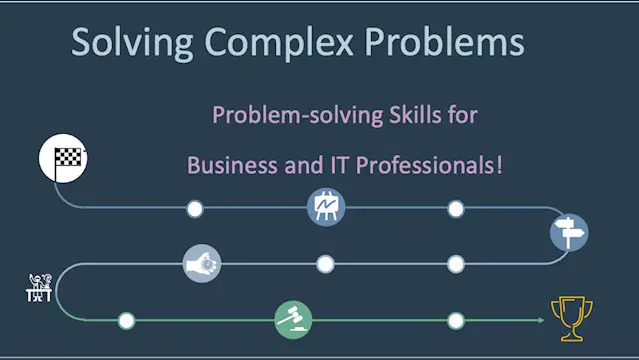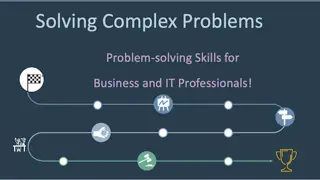
Methods to Solve Complex Projects and Operational Problems
Problem-solving and Decision-making for Business and IT Professionals with Divergent & Convergent Thinking Method
Christine Aykac
Summary
- Certificate of completion - Free
- Reed courses certificate of completion - Free
- Tutor is available to students
Add to basket or enquire
Overview
Are you looking for a course that can help you solve complex problems? Look no further than our Complex Problem-solving Course.
In today's complex business world, you need every tool at your disposal to succeed. That's where our eLearning course comes in. It demonstrates how to use divergent and convergent thinking to resolve complex problems and rescue your project. You'll learn how to engage the right resources with the right questions, understand key concepts, and reach a consensus with all impacted parties. With this essential knowledge in your toolkit, you'll be able to overcome any obstacle and achieve success.
According to PMI research, 74% of projects are failing. It does not matter how good your planning is or how well you’ve put your project plan together. There will always be unforeseen problems that need to be resolved immediately! This course aims to teach the benefit of using a systematic problem-solving method to resolve complex problems, define the root cause of a problem, identify an acceptable solution, assess the risk, and then implement the best-fitting solution.
This is a very simple and easy-to-apply complex problem-solving approach, using powerful questions. You can start using them right away, whether you manage a project or run an operation. This approach applies to all situations, even if it is a simple challenge you are experiencing.
The eLearning is designed to demonstrate how to engage the right resources with the right questions, the importance of thinking & understanding, and how to reach a consensus to resolve complex problems and rescue your project with a simple but effective method. We will also discuss the importance of getting an agreement from all impacted parties: stakeholders, subject matter experts, and sponsors.
At the end of this course, you will better understand what it takes to be an effective problem solver. You'll also know how complicated problems are usually solved and why they cannot always provide quick results without applicable skills like brainstorming or estimation, which can take time for some people who don't want to spend too much energy trying other methods before getting closer towards their goal as quickly possible (but still the following process). Last but not least, no matter whether one's task involves complex issues, such as involving many variables that need careful consideration during troubleshooting sessions - all aspects of the complex problem deserve attention. We do not want to miss anything and encounter the same problem over and over again.
In this eLearning course, you'll learn how to use divergent and convergent thinking to reach a consensus and rescue your project. You'll also learn how to engage the right resources with the right questions, understand key concepts, and assess risk. With this essential knowledge in your toolkit, you'll be able to overcome any obstacle and achieve success.
Let's continue to learn, grow, and lead with purpose. See you in the class!
Christine
Coach & Trainer
Keep learning, keep innovating, and keep adapting!
Curriculum
Course media
Description
Many problem-solving methods exist, but they can be ineffective when applied to complex problems. A problem is considered complex when it has many interrelated factors and when cause and effect are not immediately apparent. In such cases, a traditional problem-solving approach that relies on linear thinking and a strict cause-and-effect analysis is often not enough. Fortunately, there is a problem-solving method specifically designed for complex problems: the Kepner and Fourie (K&F) approach. This approach helps you to get to the root cause of a problem. However, the K&F method is more than just a simple question-asking exercise. It is also a powerful learning tool that can help you understand the system in which the problem exists and identify potential solutions.
So, what is the Kepner and Fourie approach? In a nutshell, it is a structured problem-solving method that uses a cause-and-effect diagram to help you identify the root cause of a problem. The K&F approach also helps you understand the relationships between the different factors contributing to the problem. This understanding is critical because it allows you to identify potential solutions that address the root cause of the problem rather than just its symptoms.
If you want to learn more about the Kepner and Fourie approach, then this course is for you. In this course, you will learn about the history of the K&F approach and how it can be used to solve complex problems. You will also learn about the different steps in the K&F method and how to apply them to a real-world problem. By the end of this course, you will have a solid understanding of how to use the K&F approach to solve complex problems.
In addition, you will gain valuable skills in divergent and convergent thinking to effectively reach a consensus and save your project. You will also learn how to engage the appropriate resources by asking the right questions, grasping important concepts, and evaluating potential risks. Armed with this vital knowledge, you will be equipped to conquer any challenge and attain success.
At the end of this course, you will better understand what it takes to be an effective problem solver. You'll also know how complicated problems are usually solved and why they cannot always provide quick results without applicable skills like brainstorming or estimation, which can take time for some people who don't want to spend too much energy trying other methods before getting closer towards their goal as quickly possible (but still the following process).
Important Note: This eLearning course offers 1 Leadership and strategy-related Continuous Education Points (CEP) / Professional Development Units (PDU) / Continuing Professional Development (CPD) for certification holders. To learn more about how to register your credits, please contact me.
Enrol in this course today and start learning how to use the Kepner and Fourie approach to solve complex problems!
Christine
Coach & Trainer
Keep learning, keep innovating, and keep adapting!
Who is this course for?
This course is open to anyone:
- Operational and project managers and their teams
- Process managers and practitioners
- Delivery team members, including Product Owners, Scrum Masters, and Tem leads
- Anyone in mediator or facilitator roles
- Consultants and contractors
- Anyone coordinating multiple segment workforce
Requirements
This course is designed for individuals who want to learn problem-solving and complex issue resolution. While there are no prerequisites for this course, it is beneficial to have some experience participating in problem-solving or issue-resolving activities.
During the course, you will have the opportunity to learn about various problem-solving techniques and practice using them in complex situations. You will also learn about the different stages of problem-solving and how to effectively work through each stage. By the end of the course, you will better understand how to solve problems and resolve complex issues.
Career path
If you find yourself struggling to keep up with the ever-changing landscape of work, it is time to consider learning new skills. At first, the prospect of learning new skills can seem daunting, but with the right attitude and approach, you can benefit from the following learnings:
- Adaptive Leadership: Unlock Your Professional Potential
- Agile Foundation: Guide to Getting Started with Agility
Questions and answers
Currently there are no Q&As for this course. Be the first to ask a question.
Certificates
Certificate of completion
Digital certificate - Included
Once you have completed your course, you will receive a certificate via email that contains your PDU/CDU information. This certification is evidence of your continued learning and professional development and is essential for maintaining your professional certifications.
The certificate will be sent to the email address that you provide at the time of registration, so please make sure that you provide a valid and current email address. If you have any questions about the certification process, please get in touch with us. We will be happy to assist you.
Thank you for choosing our course!
Reed courses certificate of completion
Digital certificate - Included
Will be downloadable when all lectures have been completed
Reviews
Currently there are no reviews for this course. Be the first to leave a review.
Legal information
This course is advertised on reed.co.uk by the Course Provider, whose terms and conditions apply. Purchases are made directly from the Course Provider, and as such, content and materials are supplied by the Course Provider directly. Reed is acting as agent and not reseller in relation to this course. Reed's only responsibility is to facilitate your payment for the course. It is your responsibility to review and agree to the Course Provider's terms and conditions and satisfy yourself as to the suitability of the course you intend to purchase. Reed will not have any responsibility for the content of the course and/or associated materials.


